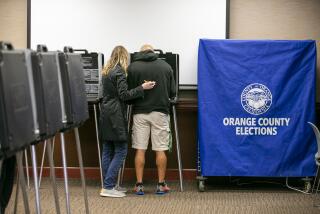Huntington Beach Family ‘Diversifies’ Business : Police Rub Off Winner in Raid on Mini-Lottery
- Share via
Accompanied by a state lottery agent, Huntington Beach police seized flyers, tickets and bookkeeping materials Tuesday from a family that allegedly had been conducting a private--and illegal--lottery from their home.
Huntington Beach resident Keith Hard, 25, owner of a mail-order gift business called Hardcastle Enterprises, admitted later Tuesday that he and his parents had been conducting their own private lottery--”the trail-blazing Hardcastle Mini Lottery” complete with carnival-type red lottery tickets and the promise of a $100 “grand prize.”
But, Hard said, when he and his parents expanded their business last month to include a lottery, they did not know that they were doing anything wrong.
They had believed that because voters approved the California Lottery last November, all lotteries are now legal, he said.
“I hope I don’t get in any trouble over this,” Hard said.
But the Hards have no license to sell California Lottery tickets, and the only legal lottery is the one run by the state, lottery agent Wayne Mackley said.
Although no arrests were made during the 7 a.m. raid on the Hards’ Zeider Lane home, Mackley and Huntington Beach officers said they would be asking the Orange County district attorney’s office to issue misdemeanor charges against the Hards for allegedly conducting an illegal lottery.
“Anytime you have the elements of money, a prize and chance, you have an illegal drawing,” Detective Ron Pomeroy said. And the Hards had all three, he said. Lottery officials and the police said they believed that the Hards’ lottery is the first example of an illegal lottery spawned from the official state lottery, which began Oct. 3. But it probably won’t be the last, they added.
Former truck driver Keith Hard said he and his parents, factory manager James Hard, 55, and school secretary Jerry Hard, 49, started their own lottery as “kind of like a new project,” a promising addition to their small mail-order gift business.
On Sept. 13, Hard said, the family sent a bulk-mailing to 5,000 Huntington Beach residents inviting them to pay $1 each for Hardcastle’s own carnival-red lottery tickets.
“The state lottery tickets were due to come out Oct. 3, and I figured if we could get ours out roughly about the same time, because of the opportunity of it, we could make a little money,” Hard said.
Their flyer was quick to draw a connection between their lottery and the state’s.
“As you know, California voters recently made the decision to legalize lotteries. (Finally a breath of freedom!),” it said. “We here at Hardcastle Enterprises are proud to be among the first to offer tickets for the TRAIL-BLAZING HARDCASTLE’S MINI LOTTERY.”
Each mail order--a minimum purchase of five tickets required--would allow residents to compete for a $100 “grand prize” in Hardcastle’s first private drawing on Dec. 15, the flyer said.
“We have some more good news,” it continued. “HARDCASTLE ENTERPRISES ALSO PLANS TO OFFER ALL OF THE CALIF STATE LOTTERIES AS SOON AS THEY BECOME AVAILABLE!!!”
The response was not quite what they expected. Only five people sent in money--only $25--for lottery tickets, Hard said, not nearly enough to meet their $500 to $600 printing bills.
But the flyer did get the attention of other Huntington Beach residents, including three police captains who received it.
Startled by Claims
Capt. Don Jenkins, who supervises fraud investigations, was one of the recipients. He said Tuesday that he had been startled by the flyer’s claims.
“I turned it over to my fraud investigators,” he said.
In their search Tuesday, investigators found flyers and tickets but little other lottery paraphernalia--no drum or box for the upcoming drawing, for instance, lottery agent Mackley said.
He called the private lottery, with its small tickets “a true illegal lottery in the classic sense.”
Illegal lotteries such as this one are “difficult to control,” Mackley said. “We can’t assure that victims will get their money back or even get a prize. Also, mail-order lotteries are prohibited,” he said.
More to Read
Sign up for Essential California
The most important California stories and recommendations in your inbox every morning.
You may occasionally receive promotional content from the Los Angeles Times.













